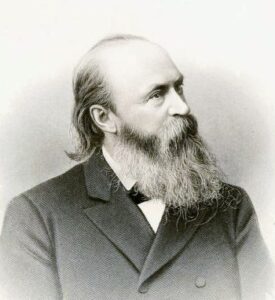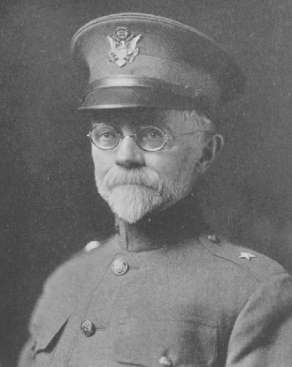
Alfred Isaac Sawyer
Image Source: Lavonia Marie D’Arpini
Alfred Isaac Sawyer M.D. (31 October 1828 – 7 May 1891) was an American homeopathic physician who practiced in Ohio and Michigan. He was a graduate of the Western College of Homeopathic Medicine in 1854 and the Cleveland Homeopathic Hospital.
In 1854, Alfred Sawyer first set up in practice in Marietta, Ohio, with Dr. Ephraim Craig Beckwith (1824 – 1880). He subequently practiced in Ann Arbour and in Monroe Michigan.
Alfred Isaac Sawyer was an American delegate to the International Homeopathic Congress in London in 1881.
In 1827 the family settled in what was known as the Connecticut Fire Lands, more commonly known as the Western Reserve in Ohio. Alfred was the 11th child and 8th son.
Of all the children, he did not follow in his father’s footsteps and farm. At the age of 17 he sought to improve his education because he felt his calling was to do something other than follow a plow. His father was not happy.
He taught school in the winter and attended the Newark Academy in the spring and fall. At the age of 24 he attended the Western College of Homeopathy in Cleveland.
In 1854 he received the degree of Medical Doctor. For two years he practiced medicine in Marieta and Zanesville, Ohio. In the fall of 1856, Sawyer went to New York City and entered the medical department of New York University.
After leaving the university he pursued studies to become a specialist of the eye. After about 3 months of study with some New York doctors, he received a diploma for ophthalmic surgery but lack of finances forced him to leave New York and find a position that would bring him a livelihood.
After visiting various places, he chose to settle and set up practice in Monroe. He was very active with the Masonic Lodge here, holding numerous positions at both the local and state level.
He was elected mayor of Monroe in 1869, 1870 and 1878. He was also a member of the school board for nine years. He was very active in the efforts to introduce homeopathy at the University of Michigan.
He repeatedly appeared before the State Medical Society, State Legislature, State courts and Board of Regents of University of Michigan. Apparently in 1847, a bill was introduced in the State legislature making it illegal to practice homeopathic medicine.
The bill failed to pass but the stage was set for the non-acceptance of homeopathic medicine at the University of Michigan. Finally in 1875, he successfully nominated the first homeopathic professors to the Board of Regents at University of Michigan.
This resulted in homeopathic graduates getting the title M. D. on their diplomas. He was also appointed to the Homeopathic Chairs of Obstetrics and Surgery at University of Michigan.
He was very active in this field of medicine. He held offices in state, national societies and was delegate to an international convention in 1881.
Dr. Sawyer passed away in 1891.
[n.b. The article quoted here was in a 2006 Monroe County Historical Museum and Society newsletter, now unavailable online. That article took much of its source material from The Michigan Pioneer and Historical Society Historical Collections Reprint Volume 18, 1911].
Alfred Isaac Sawyer first arrived in Monroe, Michigan, in 1851 and, after marrying Sara Gazena Toll (1833 – 1906) on the summer solstice, 21 June 1859, lived on what became known as the Sawyer homestead in the town until 1870. Thereafter Sawyer relocated while the house remained in the family.
A. I. Sawyer helped to establish the Department of Homeopathy in the University of Michigan, donating to the homeopathic department of the University his large collection of pathological specimens. He was later elected President of the Michigan State Homeopathic Society.
Sawyer was an active member of the American Institute of Homeopathy and was present at the Thirty-Eighth meeting held at St. Louis, June 1885. There, along with colleagues Drs. Timothy Field Allen, Francis Hodgson Orme, Jabez Philander Dake, Andrew R. Wright and Israel Tisdale Talbot, he contributed to a prize fund for “meritorious provers” of homeopathic medicines.
Sawyer was a senior Freemason, and served as mayor of Monroe in 1869, 1870, and 1877.
Alfred Isaac Sawyer died at home in the morning of 7 May, 1891, leaving his wife and two children, a son and a daughter. He was buried in Monroe’s Woodland Cemetery. His daughter, Jenny Toll Sawyer deeded the Sawyer House to the city of Monroe as a community center.
Of Interest:
 The Sawyer surname contributed one Chair of Obstetrics and Surgery at University of Michigan and the President of the Michigan State Homeopathic Society; one orthodox doctor who converted to homeopathy to become the President of the American Institute of Homeopathy; and one White House Physician and Brigadier General in World War 1.
The Sawyer surname contributed one Chair of Obstetrics and Surgery at University of Michigan and the President of the Michigan State Homeopathic Society; one orthodox doctor who converted to homeopathy to become the President of the American Institute of Homeopathy; and one White House Physician and Brigadier General in World War 1.
Benjamin Edward Sawyer M.D. (11 August 1811 – 1 August 1879) was an American orthodox physician who converted to homeopathy. Benjamin Sawyer was the homeopath of Nathaniel Hawthorne’s wife, Sophia Peabody, and his daughter, Annie Sawyer Downs, was a friend and fellow botanist of Henry David Thoreau. Benjamin Sawyer practiced in Concord and later Haverhill, Mass.
Charles Elmer Sawyer (January 24, 1860 – September 23, 1924) was the White House Physician to President Warren G. Harding and his wife Florence. Harding appointed him Surgeon General and Brigadier General. Charles Elmer Sawyer was also the homeopath of Hardin’s successor President Calvin Coolidge. Charles Elmer Sawyer was also a personal friend of Florence Nightingale.
Decatur Mowry Sawyer (1 February 1849 – 7 January 1931) [no evident relation] was a wealthy American businessman who consulted and supported homeopaths.



Leave A Comment